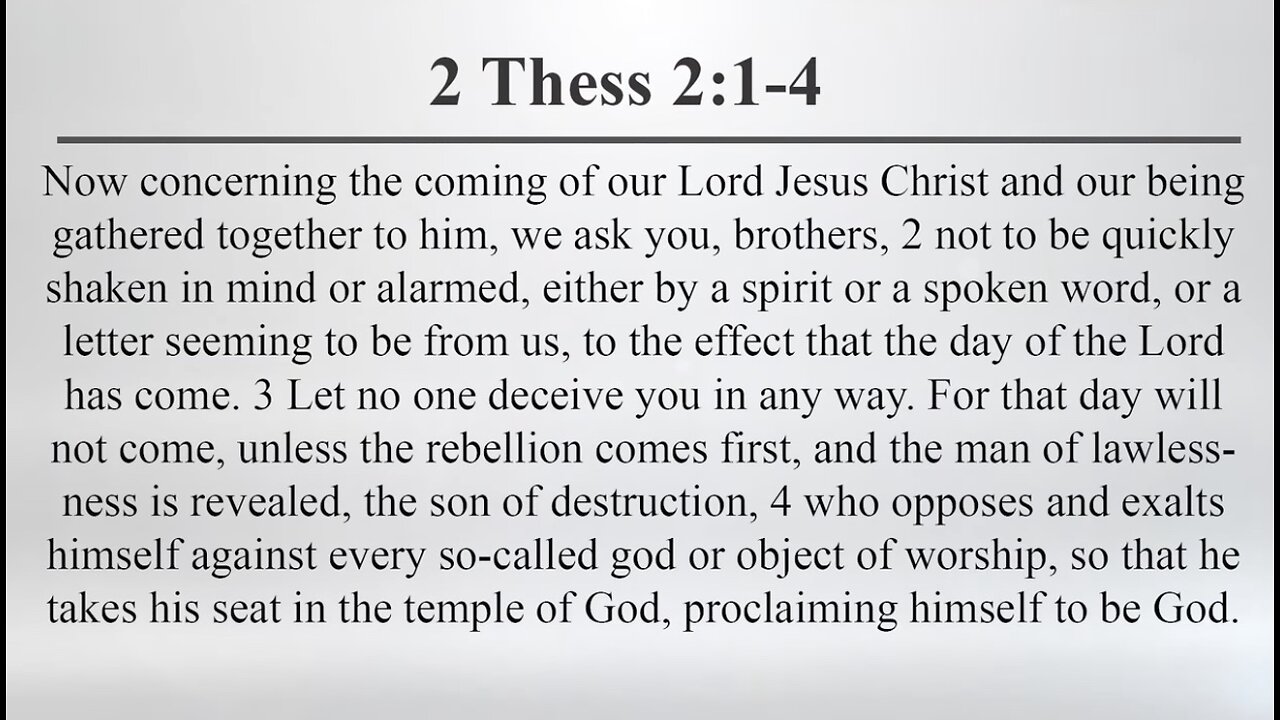Premium Only Content

The most problematic passage in the Bible for Pretribulationists
Transcript of Video:
“Now concerning the coming of our Lord Jesus Christ and our being gathered together to him, we ask you, brothers, not to be quickly shaken in mind or alarmed, either by a spirit or a spoken word, or a letter seeming to be from us, to the effect that the Day of the Lord has come. Let no one deceive you in any way. For that day will not come, unless the rebellion comes first, and the man of lawlessness is revealed, the son of destruction, who opposes and exalts himself against every so-called god or object of worship, so that he takes his seat in the temple of God, proclaiming himself to be God” (2Thess. 2: 1-4).
Alan Kurschner: “The most problematic passage in the Bible for Pretribulationists is 2nd Thessalonians 2.”
Second Thessalonians was written by the apostle Paul, in part to refute a false teaching circulating at the time that the Thessalonians had missed the rapture and were in the Day of the Lord.
Paul’s message to the Thessalonians was very simple. He told them not to worry, they had not missed the rapture and were, therefore, not in the Day of the Lord.
Alan Hultberg: “And so, the way he disabuses the Thessalonians from that notion is he says, ‘certain things have to happen first.’ And those things were the apostasy and the revelation of the man of lawlessness (that is the Antichrist…).”
There are two main reasons why this is a problem for the Pretribulationists.
The first is that as we have seen Pretribbers maintain that there are no events that must occur before the rapture, and here Paul blatantly says there are two events that must occur first, the rebellion (sometimes translated as apostasy) and the revealing of the man of lawlessness.
Alan Hultberg: “If Paul had taught Pretribulationism, his simplest answer would be, ‘No, the rapture hasn’t occurred yet.’ Instead of, ‘No, there are certain things that have to happen first.’ And as soon as you say, ‘There are certain things that have to happen first,’ you’ve undermined Pretribulationism. So, Pretribulationists have a very difficult time, in my opinion, making 2nd Thessalonians to fit with their thinking.”
Charles Cooper: “2nd Thessalonians 2 poses the greatest problem for the Pretrib position, or certainly is one of the greatest problem passages for the Pretrib position because Paul does exactly what the majority of Pretribbers say does not occur. And that is he gives us a list of [the] chronology of events specifically connected to the rapture.”
We know that Paul was teaching that these two events would occur before the Day of the Lord, in part because he uses the specific Greek work “proton or protos” which is often translated “first,” and is specifically used here to describe when these two events would take place in relationship to the Day of the Lord.
Alan Kurschner: “In the Greek. The Greek is very specific. It uses the term protos and it means before or first. So, Paul here is teaching explicitly that two events have to happen before the Day of the Lord.”
Alan Hultberg: “Yeah. The fact that Paul says, ‘These things must happen first’ is important. He doesn’t just say, ‘These things must happen, but these must happen first.’”
The second problem for Pretribulationists is that at least one of the precursors mentioned here, the revealing of the “man of lawlessness,” is an event that takes place at the midpoint of the 7-year period.
Alan Hultberg: “And most significantly, this revealing of the man of lawlessness, which Paul describes in saying, ‘He will set himself up in God’s temple, proclaiming himself to be God,’ which places the revealing of the Antichrist at the midpoint. So, the coming of our Lord and our being gathered to Him cannot occur until after the midpoint of the 70th week.”
Take a look at this chart detailing the views of five prominent Pretribulationists about 2nd Thessalonians 2, and you can get a sense that they have fundamentally different, often mutually exclusive ways of explaining this section of Scripture. But despite this confusion there are some Pretrib arguments about 2nd Thessalonians 2 that are more common than others.
For example, the most common way that Pretribulationists deal with this is to say that Paul did not actually mean that these two events would happen before the Day of the Lord, rather he meant that these two events will happen during, or be features of the Day of the Lord. For example, in his commentary, David Guzik says of this problem:
“Paul will not describe events which must precede the rapture, but events that are concrete evidence of the [Day of the Lord].”
They are saying that Paul wasn’t saying these two events would come before the Day of the Lord, rather Paul was just naming things that happen during the Day of the Lord.
Despite this denial that Paul meant these things would happen before the Day of the Lord being one of the most common ways Pretribulationists deal with this problem, Pretribulationists never seem to explain why they feel it’s okay to ignore the grammar of this passage such as the Greek word proton which is sometimes translated as “first” which means that these two events must come before the Day of the Lord.
You can confirm this by looking at other places in the New Testament where the same Greek construction occurs, the same conditional word ean me paired with proton always means one thing comes before the other. [For example,]
“Our law doesn’t condemn a man unless (ean mē) it first (proton) hears from him and learns what he is doing, does it?”
Another example of the same construction is in Mark 3:27,
“But no one can enter a strong man’s house to plunder his property unless (ean mē) he first (proton) ties up the strong man; then (tote) indeed the house can be plundered” (Mark 3:27).
These two examples that share the same Greek construction with 2nd Thessalonians 2:3 confirm that the correct reading here is that before the Day of the Lord begins, two events must happen first: the rebellion and the revelation of the man of lawlessness.
Alan Kurschner: “So at the end of the day, with all these interpretations, the 800 pound gorilla is the word protos.”
Another popular way that Pretribulationists try to deal with 2nd Thessalonians 2 relates to the word rebellion, sometimes translated as falling away or apostasy in verse three. It is one of the two things that are supposed to happen before the Day of the Lord. This is usually understood to mean a falling away from the faith. That is, Christians apostatizing (or leaving the faith of Christianity).
Recently, some Pretribulationists have put forward the idea that the word behind this word rebellion, apostacia in the Greek, means the rapture. The idea is that Paul was teaching that the rapture would happen first, and then the Man of Lawlessness would be revealed. This is usually done to preserve the all-important Pretrib doctrine of imminence—that no events can come before the rapture.
Charles Cooper: “But in 2nd Thessalonians, they come to this text, they’ve got a real problem. They know it’s difficult. They know it poses a great problem for their position. So, what do they do? They take a word, apostasy, [and] say, ‘Aha! This word is referring to the rapture—the falling away, the taking away of the believers on the earth.”
This interpretation has two serious problems:
The first is the complete lack of any evidence that the word apostacia can mean the rapture.
And the second is that such an interpretation would mean that Paul is making a nonsensical and utterly useless point in this passage.
Pretribulationists claim that the apostacia can mean the rapture because the word is sometimes translated in early English Bibles like Tyndale and Geneva Bibles as the English word “depart.” They would say that if the word can mean “depart” in English, it might also be a reference to the rapture, where believers will depart the Earth.
The problem is that the word is never used that way. When the early English Bibles used the English word “depart” to define apostacia they meant it to be understood in a non-spatial sense, as in, “he departed from the faith”, or “he departed from sound doctrine.” The word is never used to describe physical departure as in, he departed from his house, or as in our case, he departed from the earth.
Alan Kurschner: “It always means a non-physical departure, such as for example, a political rebelling or… an apostasy from the faith.”
The word is used five other times in the Bible and each time it’s used in a political or religious sense: never in a physical sense.
Even if you expanded your search to include all of the secular writings in Koine Greek, you wouldn’t find the word used in a spatial or physical sense.
Charles Cooper: “Show me a historical reference where this word is used that way. Any writing, any historical writings. Two hundred years before the New Testament. Two hundred years after [the] New Testament.”
In defense of this view, some Pretribbers will go so far as to committing the so-called “root fallacy.” What they will do is say that the root for apostacia, which is probably the Greek word aphistemi, can mean a physical departure.
This method of interpretation is universally rejected by Greek Scholars because it’s not a reliable way to determine the definition of words. To give you an example from English, the root word for “nice” in Latin actually means to be ignorant, but no one thinks that the sentence “John is nice” has anything to do with John being ignorant. Bringing up the root of apostacia is a desperate attempt to defend a particularly bad theory.
The second reason this argument makes no sense is that if the word apostacia means the rapture, then Paul’s argument to the Thessalonians is essentially that the rapture can’t happen…until the rapture happens!
Ryan Habbena: “The fatal problem with this is Paul says that these things happen before the coming of our Lord and our being gathered to Him which is the rapture. And so, it is illogical to say that the rapture must occur before the rapture occurs.”
Alan Kurschner: “What it’s doing is making Paul say that while the rapture can’t come before the rapture.”
To their credit, this apostacia is the same thing as the rapture theory is openly rejected by vast majority of Pretrib scholars.
Alan Kurschner: “Even their own scholars, such as Paul Feinberg and John Walvoord, two of the most esteemed Pretribulational scholars, have completely rejected this interpretation.”
Alan Hultberg: “They haven’t even convinced all Pretribulationists of this who argue that ‘the apostasy’ (in Greek ap-os-tas-ee’-ah) means ‘The rapture; by that, Paul means the rapture.’ That’s a very difficult case to make, if not an impossible case to make.”
Some Pretribulationists who don’t want to play the kind of games with the text we just saw, will actually agree that Paul wrote that the apostasy and the revealing of the man of lawlessness will occur first, or before the Day of the Lord.
Take for example, John Walvoord and John MacArthur. Both men in their commentaries tell their readers that the two events, the rebellion and the revealing of the Antichrist, would occur before the Day of the Lord—which of course we agree with. But for them it’s a very odd thing to say since, in other places, they teach that the Day of the Lord is a 7-year period which is immediately preceded by the rapture.
And since both men also agree that the “revealing of the man of lawlessness” in verse 3 is a reference to the Abomination of Desolation which happens at the midpoint, they are essentially saying that something which they know happens at the midpoint, occurs before the Day of the Lord. The obvious result is that the Day of the Lord can’t be the 7-year model that they teach in other places. The rapture must start sometime after the midpoint. This massive contradiction is not brought up or explained in either of their commentaries.
Astute viewers have already noticed another contradiction which is “How can they teach that these two events occur before the Day of the Lord but not before the rapture?” Since, like most Pretribulationists, they teach that the Day of the Lord occurs immediately after the rapture, with no significant gap between the rapture and the Day of the Lord. In other words, since neither Walvoord or Macarthur are rapture gap theorists, in their view, if something is before the Day of the Lord it is necessarily before the rapture as well. So, why are they essentially teaching here what they certainly don’t agree with in other teachings—that there are events before the rapture? It’s not clear. As I said they don’t mention these serious contradictions in their commentaries.
This could be called the “Forgetful Paul View.” Because in their commentaries and sermons, they will correctly teach that in verse one, the words coming and gathering are in fact references to the rapture.
Alan Kurschner: “This is not a debate among Pretribs or Prewrathers. Pretribs and Prewrathers agree that this reference, ‘the gathering to be with Him’ in 2nd Thessalonians 2:1 is the rapture.”
But they will go through the rest of their commentaries talking about these two precursors to the Day of the Lord as if they are only precursors to the Day of the Lord, as if they have nothing to do with the rapture. It’s as if Paul forgot to talk about the rapture, even though he said that was specifically what he was going to talk about in this section.
Alan Kurschner: “He says, ‘Now regarding the arrival of our Lord Jesus Christ and our being gathered to him—’ Let me just stop there. Well, Paul hasn’t made any connections here. He’s just saying, ‘Now I’m going to talk about this.’Now, isn’t it sort of odd if he says, ‘Now, I’m going to talk about the rapture and the parousia.’ And then he doesn’t mention it ever again?” Well, he actually does. He’s unpacking what it means: The Day of the Lord.”
Prewrath solves this problem by understanding that these two events that will occur before the rapture and before the Day of the Lord, and that Paul is using both concepts interchangeably here as he often does in the New Testament.
Prewrath also understands the revealing of the Antichrist in verse 3 is a reference to the Abomination of Desolation at the midpoint of the 7-year period.
They also see the falling away (or rebellion) in verse three as a reference to the “falling away” that Jesus mentions in association with the Abomination of Desolation in Matthew 24.
In fact, this clear and consistent connection between Matthew 24 and 2nd Thessalonians 2 is a really important point!
Alan Kurschner: “A fundamental problem of the way that Pretribulational interpreters interpret the apostle Paul is they don’t recognize that Paul is getting his teaching from Jesus.”
For example, just look at the similarities. In Matthew 24, before the rapture in verse 31, what does Jesus say must come first? You guessed it! A falling away, and the abomination of desolation, and its only after those events occur that you can you expect to see the sign of the impending Day of the Lord in verse 29, and the rapture in verses 30 and 31 just before it begins.
Jesus’ teaching on the end times is a perfect mirror to Paul’s in terms of the timing of events which is probably why Paul said that he got this doctrine about the rapture, quote: “from the Lord.”
Alan Kurschner: “How do we know that the apostle Paul received his teachings from the Olivet Discourse, from Jesus’ Olivet Discourse? Well, we know this, we know this because there are at least 30 parallels between Paul’s teaching in 1st and 2nd Thessalonians and between Olivet Discourses. Thirty cohesive links between their teachings.”
It’s not just Prewrathers that see the connection between the 1st and 2nd Thessalonians and Matthew 24. Just check the margins of your favorite Bible. Ever since cross-references have been invented, they have been linking these two passages; it’s only the Pretribulationists who can’t accept that these passages are parallel to one another.
Alan Kurschner: “If you’re a Pretribulationist, just…, lay your presuppositions aside for a moment and just read 2nd Thessalonians 2 without your traditions and see what it says.”
-
 21:53
21:53
Glenn Greenwald
4 hours agoMichael Tracey on the Street: What Do People Think of the Epstein Case?
82.6K47 -
 LIVE
LIVE
megimu32
1 hour agoOTS: Board Games Gone Wild! The Loud, Weird & Chaotic Games That Raised Us
149 watching -
 LIVE
LIVE
DamnDanieI
1 hour agoKill First, Loot Later – OTG Live
288 watching -
 56:41
56:41
Donald Trump Jr.
6 hours agoLies, Leaks, and Lawfare: Censorship Corruption Exposed | TRIGGERED Ep.263
112K103 -
 LIVE
LIVE
Precision Rifle Network
3 hours agoS4E25 Guns & Grub - Rex Is Back, I shot the 6.5PRC finally...
21 watching -
 LIVE
LIVE
rhywyn
48 minutes agoうつ
41 watching -
 LIVE
LIVE
RyuMuramasa✧
2 hours agoNEW Everdark Sovereign | Elden Ring Nightreign | LIVE Playthrough
69 watching -
 1:17:04
1:17:04
Nikko Ortiz
9 hours agoLive - News, Politics, Podcast And Naaah Im Playin We Chillen
1.99K -
 1:26:13
1:26:13
Mally_Mouse
4 hours agoLet's Hang!! -- P.O. Box & Chill!
9.71K -
 1:02:37
1:02:37
BonginoReport
5 hours agoKamala Teases Book About Dumpster Fire Campaign - Nightly Scroll w/ Hayley Caronia (Ep.102)
61.1K42